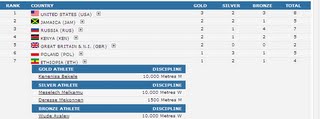Against Ethiopian and Kenyan dominance in Athletics: IAAF and Europe to take radical step?
Criticisms have been labelled at the International Association of Athletics Federation (IAAF) Council for recommending that the World Cross Country Championships be held biennially because East African athletes from Ethiopia and Kenya are dominating the game.
The IAAF’s cross-country athletic championship which is held annually could, if the IAAF Congress accepts, be held every two years because “Ethiopia and Kenya are killing the sports.”
Europe has expressed concern over the large dominance of East African athletes and see no reason why it should field its athletes every year if they end up coming home empty-handed. “In 1973, 85 per cent of the competitors were from Europe. This year the figure had dropped to 29 per cent and there were no teams in Edinburgh from France or Germany,” Pierre Weiss, IAAF general secretary, quoted in April during the Edinburgh World Championships.
Paula Radcliffe and Sonia O’Sullivan from Britain and Republic of Ireland are the only two European athletes who have won the competition in recent years.
Since 1981, East African athletes have maintained dominance in the sports and after the Edinburgh championship that saw Ethiopia’s Kenenisa Bekele and Tirunesh Dibaba won all four individual gold medals and two of the team titles, where only two Europeans are in the top 50, the IAAF Council had had enough.
Not only African but...
At the Berlin meeting last week, the IAAF council recommended that the events be held biennial so the alternate year can be used for African championships. "The World Cross Country championships have become not only an African affair but an East African affair, and these days you don’t even get athletes from West Africa competing," IAAF President Lamine Diack quoted by Kenyan Daily Nation at the Berlin Intercontinental Hotel. "Even the Kenyan delegates at our meeting agreed that East Africa’s dominance was killing the sport," said Diack.
"The problem is also that the teams are too large. It would have been better to, perhaps, have three runners in each team, but with as much as six runners per country per race, Ethiopia and Kenya will automatically take the first 12 places and the rest will compete from the 13th place. European broadcasters are no longer interested in covering these championships and some European federations are no longer interested in sending athletes to these competitions. Why should they invest to fight for 13th place?" said Merlo, an editor with leading Italian daily sports newspaper La Gazzetta dello Sport.
Will Nadal or Federer be treated the same?
Africans are outraged at the IAAF recommendation. Selemy Yohannes said: “I am ashamed of the one who initiate this idea. The mere fact that European countries are unable to compete in the world cross country championship made the IAAF council suggest that an annual event be held bi-annually? This is nothing but illicit continuation of the garbage idea of apartheid. I will be surprised if the world cup could be changed to every eight years because Brazil is a dominant force. Or can someone question Roger Federer and Raphael Nadal’s dominance in the Tennis championships. It will be a shame on the Kenyan representative if they accept the recommendation.”
Haile Abi writing from Ethiopia said: “They can’t invest anymore in an annual sports event because they are not dominant but they can invest in their media portraying our mothers and children as starving people and happy to send us false fertiliser.”
Richard from the United States also said: “This is actually laughable!! How can someone be penalized for being good at what he does? “
Meanwhile, Two Kenya officials, Isaiah Kiplagat and David Okeyo who sit at the IAAF council and cross country committee respectively are yet to make any comment.

